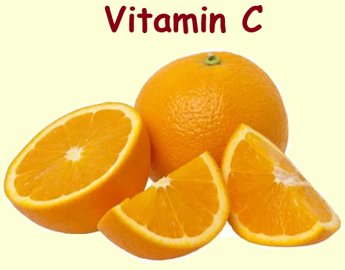Vitamin C Benefits, Sources, and Daily Requirements
Vitamin C, also called ascorbic acid, is a water-soluble vitamin and an essential micronutrient. It supports many important functions in the body. Vitamin C helps boost the immune system and also plays a key role in maintaining healthy skin, bones, and blood vessels. Overall, it is vital for good health and wellness.

Key Functions of Vitamin C
Collagen production – Vitamin C is vital for producing collagen, a protein that maintains healthy skin, tendons, ligaments, and blood vessels.
Wound healing and bone health – It speeds up wound repair, supports scar tissue formation, and helps maintain strong bones, teeth, and cartilage.
Iron absorption – Vitamin C boosts the body’s ability to absorb iron from plant-based foods, reducing the risk of iron deficiency anemia.
Antioxidant protection – As a powerful antioxidant, Vitamin C neutralizes free radicals, protecting cells from damage linked to aging, heart disease, and cancer.
Brain support – It aids in the production of neurotransmitters, improving communication between nerve cells and supporting healthy brain function.
How Much Vitamin C Do You Need Daily?
Since the body cannot produce Vitamin C, it must be obtained through diet or Vitamin C supplements. Recommended daily intake:
Men: 90 mg
Pregnant women: 120 mg
Smokers: Require 35 mg more per day than non-smokers
Can You Take Too Much Vitamin C?
Vitamin C is generally safe, but excessive intake (over 2,000 mg per day) may cause side effects like diarrhea, nausea, and stomach cramps due to poor absorption.
Proven Health Benefits of Vitamin C
✅ Immune System Support: Strengthens natural defenses and protects cells from oxidative stress.
✅ Eye Health: May slow progression of age-related macular degeneration (AMD) and reduce risk of cataracts with higher dietary intake.
✅ Cancer Prevention: Diets rich in fruits and vegetables high in Vitamin C are linked to lower cancer risk, though supplements alone may not show the same effect.
✅ Heart Health: Some studies suggest Vitamin C may help with blood pressure, but overall cardiovascular benefits remain modest.
✅ Antioxidant Protection: Helps combat oxidative stress, potentially slowing aging and reducing risk of chronic conditions like arthritis and neurodegenerative diseases.
Best Food Sources of Vitamin C
You can easily meet your Vitamin C requirements by eating a variety of fruits and vegetables.
Fruits Rich in Vitamin C:
Citrus fruits: Oranges, lemons, limes, and grapefruits
Berries: Strawberries, raspberries, blueberries, cranberries
Melons: Cantaloupe, watermelon
Vegetables Rich in Vitamin C:
Cruciferous vegetables: Broccoli, Brussels sprouts, cauliflower
-
Bell peppers (red and green)
-
Leafy greens: Spinach, cabbage, turnip greens
-
Root vegetables: White potatoes, sweet potatoes
Tips to Maximize Vitamin C Intake
Eat fresh, thoughly cleaned, raw fruits and vegetables whenever possible.
Choose steaming or microwaving instead of boiling to preserve Vitamin C.
Store foods properly, as prolonged storage and light exposure can reduce Vitamin C levels.
Adding Vitamin C-rich foods to your diet not only boosts immunity but also supports skin health, wound healing, and overall well-being. A balanced diet with plenty of fruits and vegetables is the best way to ensure you get enough of this essential nutrient. Medical Disclaimer.
Read further on:
≺≺ What Is the Ketogenic Diet? Is the Keto Diet Right for Everyone?
≺≺ Why should I combine Avocados and Tomatoes?
≺≺ Cholesterol: What Does Diet Have to Do with It?
≺≺ What foods should people with high blood pressure avoid?
≺≺ Why is regular table salt considered unhealthy?
≺≺ Kosher Salt: A Kitchen Essential Explained.
≺≺ What makes Himalayan salt different from regular table salt?
≺≺ Which food is most associated with helping people live longer?
≺≺ Is Plant-Based Protein the Key to a Longer, Stronger Life?
≺≺ How important is fiber in the diet?
≺≺ What cardiovascular benefits do berries provide?
≺≺ What is the Okinawan diet? What is the secret behind Okinawan long life-expectancy?
≺≺ Ultra-Processed Foods: What They Are, Why They’re Harmful, and How to Cut Back.
≺≺ What grains have the lowest glycemic index?
≺≺ How Important Is Protein for Your Health?
≺≺ is your kid getting too much protein?
≺≺ What foods and vitamins are good for your skin?
≺≺ EWG's- The Clean Fifteen: Fruits and Vegetables with the Lowest Pesticide Levels.
≺≺ What eating strategies work best for losing weight long term?
≺≺ How Do Sugary Meals and Beverages Harm Dental Health?
≺≺ Why Vitamin B12 Is Important for Your Health?
≺≺ What food is most effective for moderating blood sugar?
≺≺ What are antioxidants? How antioxidants in the fruits and vegetables help in preventing cancers and diseases?
≺≺ How can I reduce the risk of cancer-causing chemicals when cooking or grilling meat?
≺≺ What happens to my blood vessels when I gain weight?
≻≻ Watch this page for more such informative articles on Health, Nutrition, and Wellness.
≻≻-Back to Home page.
Further reading (External Links opens in new window):
≺≺- Harvard Health Publishing - Myths and truths about vitamin C.